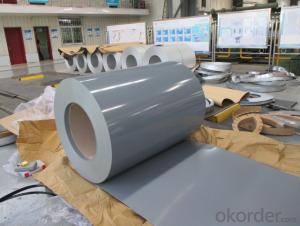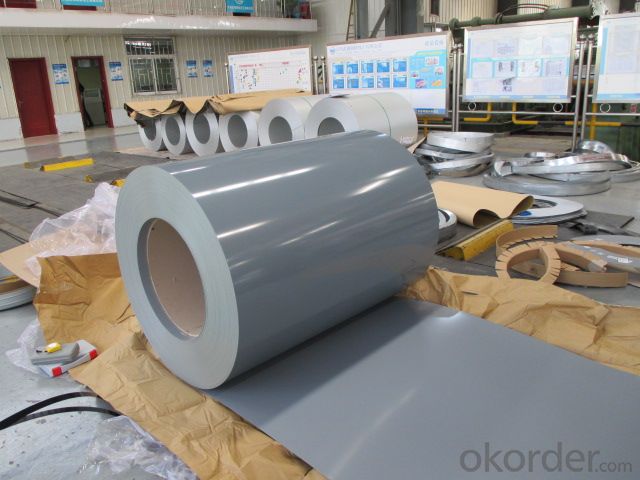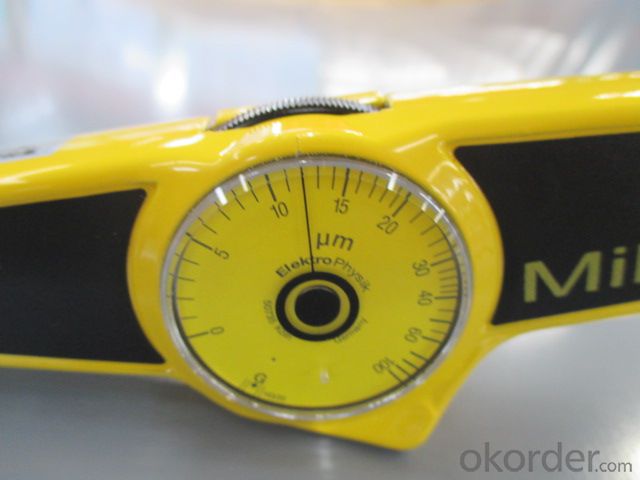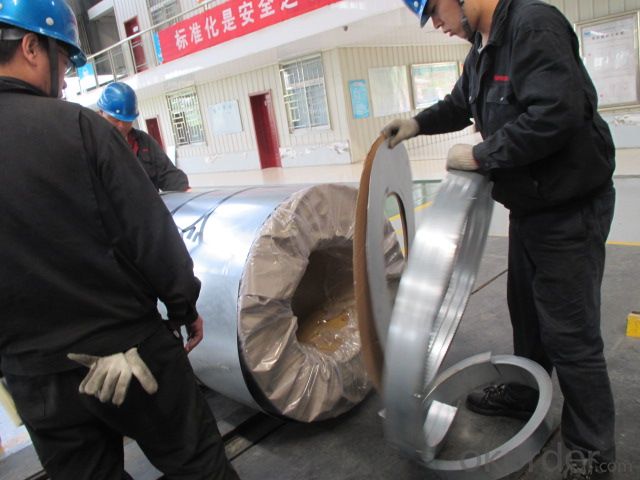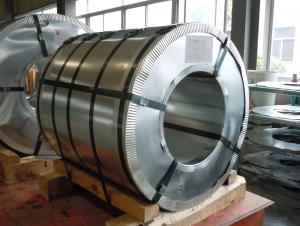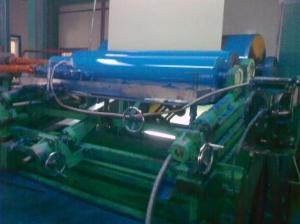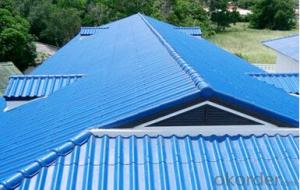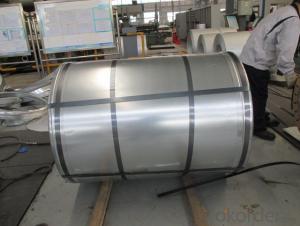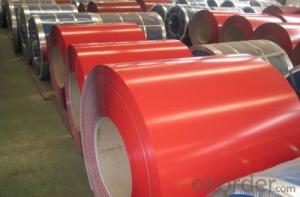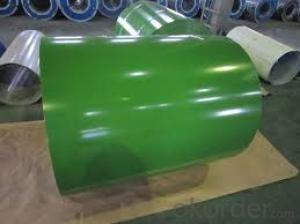PPGI 0.16-0.6mm 700-1250mm various color/20 year's experience /SGS
- Loading Port:
- Shanghai
- Payment Terms:
- TT OR LC
- Min Order Qty:
- 10 m.t.
- Supply Capability:
- 100000 m.t./month
OKorder Service Pledge
Quality Product, Order Online Tracking, Timely Delivery
OKorder Financial Service
Credit Rating, Credit Services, Credit Purchasing
You Might Also Like
Product Description :
| Raw material | SGCC, SPCC, DC51D, SGHC,A653 |
| Certificate | ISO9001.ISO14001.OHSAS18001 |
| Thickness | 0.16mm-0.7mm |
| Width | 1250mm or under |
| Tolerance | thickness+/-0.01mm |
| Surface treatment | galvanized / galvalumized steel sheets |
T Bending (top-coating) T Bending (back-coating) | ≤3T ≤4T |
| Anti-MEK Wiping | ≥100times |
| Zinc coating | 40-180g |
| Type of coating structure | 2/1 or 2/2 coating, or customized |
| Standard | GB/T12754-2006, GB/T9761-1988, GB/T9754-1988, GB/T6739-1996, HG/T3830-2006, HG/T3830-2006, GB/T1732-93, GB/T9286-1998, GB/T1771-1991, GB/T14522-93 |
| Color | customized |
| Application | Building industry ,structural use, roofing, commercial use ,household appliance,industry facilities,office buildings |
Our advantage :
1. Expertise:
20 years of manufacture: we know how to properly handle every step of production.
2. Competitive price:
We produce resin and paint by ourself, which greatly reduce our cost!
3. Accuracy:
We have a technician team of 40 people and a QC team of 30 poeple, ensure our products is exactly what you want.
4. Materials:
All color Steel Sheets are made of high-quality raw materials.
- Q: what happened to all the steel beams from the WTC buildings? did anyone do any forensic analysisof any of the steel?
- Some of the steel was recycled for sale to other countries where they aren't so picky about reusing building materials. NIST had 200 pieces of the steel for their investigation, which they returned last year. This was covered in the press. The rest of the steel was held at JFK international airport's Hangar 17. Much of it will be placed/has been placed in the new museum beneath the Memorial at the WTC site. Thousands of pieces are being given out for 9/11 memorials all over the world. Just about every day you read in the newspaper about another piece going here or there to this city or that city. Yes, a lot of the steel was tested for a number of chemical compounds. It had to be for safety reasons before storing it and giving it out. Depending upon what countries the recycled beams were sent to and their rules, it was sometimes tested at the ports of entry over there, as well.
- Q: What are the challenges in coil leveling for coated steel?
- Coil leveling for coated steel presents several challenges that need to be addressed in order to achieve high-quality, flat, and smooth coils. Firstly, one of the main challenges is the potential for coating damage during the leveling process. Coated steel coils are typically coated with materials such as zinc or paint, which can be easily scratched or marred if not handled properly. The leveling process involves passing the coil through a set of leveling rolls, which can potentially cause friction, abrasion, or other mechanical damage to the coating. Therefore, it is crucial to carefully control the speed, pressure, and alignment of the leveling rolls to minimize coating damage. Secondly, the thickness variation across the coil presents a significant challenge. Coated steel coils often have thickness variations due to inherent material properties or production processes. These variations can result in uneven leveling and can lead to coils with waviness or uneven flatness. Achieving uniform leveling across the entire coil surface is essential to ensure consistent quality and appearance of the final product. Another challenge in coil leveling for coated steel is the possibility of coil shape distortion. Coating processes can introduce stresses into the steel, which can cause the coil to warp or distort during the leveling process. This distortion can result in coils with uneven edges or inconsistent flatness. Proper control of the leveling process parameters, such as the number of leveling passes and the tension applied to the coil, is necessary to minimize shape distortion. Additionally, the coil leveling process can generate internal stresses in the steel itself, particularly in coated steels that have been cold-rolled or heat-treated. These internal stresses can cause coil spring-back, where the coil tries to return to its original shape after leveling. Spring-back can result in coils with unwanted curvature or uneven flatness. Effective strategies, such as stress relief annealing or using counteracting leveling techniques, are essential to minimize spring-back and achieve the desired flatness. Finally, the handling and storage of coated steel coils present challenges in maintaining the quality of the leveled coils. Coated steel coils are sensitive to environmental conditions such as humidity, temperature, and exposure to corrosive agents. Proper storage and handling practices are crucial to prevent coating damage, rust, or other forms of deterioration that can occur during transportation or storage. In summary, the challenges in coil leveling for coated steel include minimizing coating damage, addressing thickness variation, controlling shape distortion and spring-back, and ensuring proper handling and storage. Overcoming these challenges requires precise control of process parameters, the use of appropriate leveling techniques, and adherence to strict quality control measures throughout the entire process.
- Q: What are the common standards and specifications for steel coils?
- The common standards and specifications for steel coils include ASTM A36/A36M, ASTM A572/A572M, ASTM A1011/A1011M, and ASTM A653/A653M. These standards outline the requirements for the chemical composition, mechanical properties, dimensions, and other characteristics of steel coils used in various industries, such as construction, automotive, and manufacturing. Additionally, international standards like EN 10025 and JIS G3101 are also commonly followed in different regions.
- Q: What are the different grades of steel used for coils?
- The different grades of steel used for coils vary depending on the intended application and specific requirements. Some common grades include low carbon steel (C1008/1010), medium carbon steel (C1035/1050), high carbon steel (C1074/1095), stainless steel (300 series), and advanced high-strength steel (AHSS) grades such as DP, TRIP, and TWIP. These grades offer varying levels of strength, ductility, corrosion resistance, and formability, allowing manufacturers to choose the most suitable grade for their specific coil processing needs.
- Q: But we've had a problem with bears being attracted to the water in the Intex Inflatable pools, the bear would come at night every so often and push on the sides letting out the water.Would a bear be able to bend a steel frame before I go and spend money?
- depends on the steel thickness and positioning. frm your question I'm guessing you're not really well versed in steel framing or use... im guessing whatever you build, a bear can destroy. if i was to build it not even 100 bears can destroy it. it doesn't require much steel, it's just about bracing the positing of steel and some design.
- Q: Hi there! I just purchased two cookie sheets labeled as non-stick 100% carbon steel. I've never heard of carbon steel before, and I'm trying to be careful about not using certain products that are harmful to health such as aluminum and Teflon. Is this a safe metal choice for baking?
- Yes. Carbon steel is one of the most common metals used by human beings. When the Bronze Age ended and the Iron Age started, most of the iron humans could make was carbon steel. A Cast Iron frying pan is carbon steel (well... technically, there are differences between cast irons and steels but... anyway). Our cast iron frying pans (almost the only fry pans we have used for 30+ years) are mostly non-stick because we keep them well seasoned. Humans need iron in our diet anyway. You might want to check to verify what (if anything) it is coated with to make it Non-stick because, in general, steel cookware is stick. If it is coated with ceramic (enameled), then there won't be any rust because the iron is coated and protected from water. The non-stick ceramic coatings are very good. Ceramics are chemically inert to almost everything on earth (all but some of the most exotic chemicals you will ever find in a Chem Lab). As a side note... a large number of studies of industrial exposure to aluminum and aluminum compounds (people who work in Al production plants and are exposed to large quantities for years and years and years) has shown that there is NO correlation with Alzheimers or any other diseases. The major health risk for these populations was lung problems due to inhalation of fine dust (which, turned out, was not even as bad as breathing, for example, dust containing cotton fibers in garment workers).
- Q: How are steel coils used in the production of automotive chassis?
- Steel coils are used in the production of automotive chassis as they are cut and shaped into various components, such as frame rails and crossmembers, which form the structural foundation of the vehicle. The high strength and durability of steel make it an ideal material for chassis construction, providing stability and safety to the overall vehicle structure.
- Q: Ok, so im gonna get my tragus pierced and i was wondering which is better, titanium or stainless steel. I hear like everyone uses stainless steel , but is titanium better?Thanks
- Ttitanium is better.
- Q: What are the common applications of cold-rolled stainless steel coils?
- Cold-rolled stainless steel coils have various common applications in industries such as automotive, construction, and manufacturing. They are commonly used in the production of appliances, kitchen equipment, roofing, and cladding materials due to their corrosion resistance, durability, and aesthetic appeal. Additionally, cold-rolled stainless steel coils are utilized in the fabrication of pipes, tubes, and structural components, as well as in the production of surgical instruments and medical equipment, owing to their sanitary and hygienic properties.
- Q: I'm looking to get a track bike/ fixie to ride around the city of Chicago. I've looked at many bikes and they're mostly made out of Hi Ten steel. My old fixie (which was stolen at North Ave Beach) was made out of aluminum (KHS FLITE 100). How big of a difference is it between aluminum and steel? I know steel is heavier but how does it effect the ride? Is a aluminum bike or a steel bike better to get to ride around the bike path and in the city of Chicago?
- Have you considered going to a motorcycle keep and watching at hybrid or commuter bikes? These will fall into cost range (ie. KHS, Fuji,and so on.). Aluminum is probably lighter than steel however the add-ons could make difference in the weight too. Go together with a motorbike shop that means you will be purchasing from folks who understand what they are selling. A series like performance Bike is a good way to go. The costs are right and which you can get a a lot bigger great bike in your money than you'll in finding at a department retailer, plus they provide lifetime free changes and tuneups.
Send your message to us
PPGI 0.16-0.6mm 700-1250mm various color/20 year's experience /SGS
- Loading Port:
- Shanghai
- Payment Terms:
- TT OR LC
- Min Order Qty:
- 10 m.t.
- Supply Capability:
- 100000 m.t./month
OKorder Service Pledge
Quality Product, Order Online Tracking, Timely Delivery
OKorder Financial Service
Credit Rating, Credit Services, Credit Purchasing
Similar products
Hot products
Hot Searches
Related keywords
